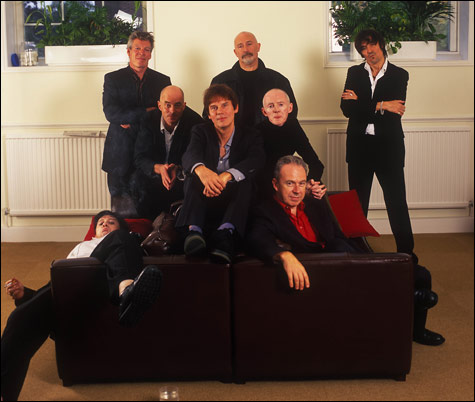
THE OLDER THE FIDDLES . . . The only difference these days with the Pogues, says Chevron (middle row, right), is that backstage "we now talk about things like spectacles and old men's illnesses." |
"There are a handful of cities around the world that are extra-special places for the Pogues to play because the audiences are super-responsive — they just get it a little more than the other places do," says guitarist Philip Chevron from his home in Dublin. "The Pogues and Boston go together in ways that belong in the realm of the unexplainable. We seemed like a comfortable fit [there] right from the beginning."
Chevron is thinking back to one of the band's first visits here, in 1986, during which he and a few other Pogues spent a hot July afternoon sitting in the Fenway bleachers and getting schooled by fans about baseball's finer points. "Though I came away knowing less than ever about the national game, I felt entirely welcome and a part of the spirit of it all."
Later that evening, when the band played across the street at the now-defunct Metro, Chevron recalls watching the "scions of the Kennedy clan, Robert Jr. and John Jr., moshing up front, as if administering some sort of sacred American-Irish imprimatur on the proceedings." (On the cover of their 1984 first album, Red Roses for Me, the Pogues had posed around a portrait of JFK.)
Now, this Friday and Saturday, the Pogues return to Lansdowne Street, to the newly opened House of Blues, for their fourth St. Patrick's Day–timed visit to the Hub in as many years. Chevron, for one, still has trouble believing it. But after breaking up in 1991 — having booted notoriously bibulous frontman Shane MacGowan along the way — and then reuniting, with Shane, for a spate of shows in 2001, a smallish Pogues tour on both sides of the Atlantic has become an annual event. "Not only did we not imagine that it would ever happen, but we certainly didn't imagine that it would carry on for as long as it has. But we got along so well that it seemed worth keeping it going for a bit longer."
Convening in the King's Cross district of North London in the early Thatcher years, the Pogues were a diverse lot hailing from both sides of the Irish Sea. Terry Woods was a veteran of trad-folk outfit Sweeney's Men; MacGowan and Chevron fronted unjustly unsung punk bands the Nipple Erectors and Radiators from Space, respectively. They were Irish and English and Catholic and Protestant and Jewish and straight and gay. But those varied backgrounds offered a unique perspective on the Celtic music that would be their stock in trade — and eventually left them open to embellishing that music with Middle Eastern and Latin flourishes.
Moreover, the octet's heterogeneity makes for a powerful alchemy. Arrayed on stage in sharp suits, with citterns twanging, tin whistles keening, accordions fluttering, and drum rolls roiling, the Pogues are a hurtling, well-oiled machine. The occasionally wobbly cog is MacGowan, standing stage center, eyes closed, clutching the mic stand, a pint glass held close to his chest as he spouts his in-the-gutter-gazing-at-the-stars poesy through a toothless, tobacco-stained gob.
How's Shane? Checking up on the rogue Pogue
It's the "Welcome" quote on the Pogues' MySpace page — which suggests it's a question his bandmates are asked an awful lot: "How's Shane?" "I never know the answer to that, to be quite honest with you," says Chevron. "I only see him when we're working, because we live such different lives. He's going to premieres and going to clubs, and I don't do that. But as far as I can tell, he's doing very well and enjoying what he's doing very much. He has his ups and downs, but mostly they're up, fortunately. "Shane has his own vision of things that you sometimes have to go with and sometimes fight against. By and large, it works very well. I wouldn't say he's the easiest person in the world to work with, but that's not why we work with him." |
Chevron says the chemistry is still there. "People do have different influences, but I think there's an unspoken consensus about what's good and what isn't. I suppose that's what keeps the dynamic going: nobody automatically excludes any idea." The only difference these days, he says, is that backstage "we now talk about things like spectacles and old men's illnesses the way that we didn't when we were 30."He knows first-hand about such things. In 2007, he was diagnosed with "locally advanced" cancer of the throat and neck. One side effect of the grueling regimen of radiation and chemotherapy was the loss of 90 percent of the hearing in his left ear. He was already deaf in his right.
That made curating the excellent new five-disc rarities box set Just Look Them Straight in the Eye and Say . . . Pogue Mahone!! (Rhino) quite a challenge. How did it feel to wade through the band's back catalogue? "Quite honestly, the overwhelming feeling I had was that I wished that I could hear things better."